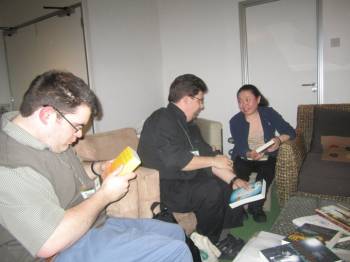Time for a look at the next four books on this season’s TV Book Club list (my first post on this series is here); these novels are all debuts.
Elizabeth Haynes, Into the Darkest Corner (2011)

In 2003, Catherine Bailey is on a night out in Lancster when she meets the handsome and charming Lee Brightman, and quickly embarks on a relationship with him. Four years later, she is a shadow of her former self: living in London with OCD, her life ruined by Lee’s abuse; her new neighbour, Stuart Richardson, may represent a chance for Catherine to move on – but there’s a threat around the corner.
Elizabeth Haynes portrays the change in Catherine’s character particularly well, right down to a difference in name: the bright, vivacious Catherine becomes the timid Cathy; the contrast between her personality in the two time periods is striking, and great at drawing one into the tale. Perhaps the novel feels a little overlong as a whole, but Haynes shows vividly how Catherine becomes trapped by Lee even as she knows he’s dangerous, and how Lee charms his way into the affections of Catherine’s friends, turning them against her. In this, Into the Darkest Corner is a sharp examination of domestic violence.
Amor Towles, Rules of Civility (2011)

New Year’s Eve, 1937: Katey Kontent is out at a Greenwich Villagejazz bar with her roommate, Eve Ross, when in walks the dashing and wealthy Tinker Grey. They get talking, become friends – and all their lives change over the following year, but don’t necessarily stay in parallel.
I’m ambivalent about this book: there’s some lovely writing and observation (‘from this vantage point [a pier on the Hudson] Manhattanwas simply so improbable, so wonderful, so obviously full of promise – that you wanted to approach it for the rest of your life without ever quite arriving’); but I can’t muster the same enthusiasm for the plot. As the title implies, we see various examples of characters’ doing what it takes to fit in to particular social circles, which is elegantly done; but, as a whole, Rules of Civility doesn’t quite do it for me.
Katie Ward, Girl Reading (2011)

I read (and really enjoyed) this last year, so I’ll reproduce here what I wrote then:
In Girl Reading, Katie Ward imagines the stories behind a number of portraits of girls and women reading; the portraits range in past time from Simone Martini’s Annunciation (1333) to a photograph on Flickr in 2008, and a concluding chapter set in 2060 provides context for the previous six. Ward has a distinctive writing style that creates a strong atmosphere for each of the time periods, and allows her to weave in details very subtly. I’ll single out her portrayal of Gwen – a girl in love with an artist in 1916, and who sees a rival for her affections in a visiting woman – as one of my favourite moments, but there are plenty more from which I could choose.
The chapters of Girl Reading are not linked overtly (though some of the portraits do appear in later chapters, and it can be nicely disconcerting to see the gap between what later characters think of the subjects and what we’ve seen of them previously); it’s more that there are contrasts and connections in theme and content. For example, Ward shows the variety of functions which the portraits might fulfil – an expression of a political alliance, say, or a tangible reminder of what has been lost. Similarly, literacy represents different things to different characters; the act of creating each portrait has varying significance; and so on.Girl Reading is an intricate tapestry of a book, and one that leaves me with little notion of what Katie Ward may write next, though I do know that I’ll want to read it.
Jessica Francis Kane, The Report (2010)

The Report revolves around a real-life event from the Blitz: the night when 173 people died in a crush on the way into Bethnal Green tube station (which was being used as an air-raid shelter). Jessica Francis Kane imagines the inquiry into the disaster, undertaken by magistrate Laurence Dunne; and follows the lives of characters involved in the tragedy, such as Ada Barber and her surviving daughter Tilly (Ada’s younger daughter Emma having been killed in the crush). A parallel narrative concerns Dunne’s being interviewed thirty years on, by a documentary-maker with close ties to the Bethnal Green incident.
The Report is very effective at portraying the disaster itself: in the scenes set during the crush, it’s impossible to gain a full picture of what is happening – yet these scenes, and Dunne’s subsequent questioning of those involved, bring home the horror of the event. But Kane also examines issues of truth, and how lasting knowledge of events can be constructed after the fact; Dunne’s attempts to give a particular impression to the people he’s interviewing for the inquiry slide into questions of what should by reported, and how – and there are no simple answers.




 I read The Rapture in advance of this week’s
I read The Rapture in advance of this week’s
Recent Comments